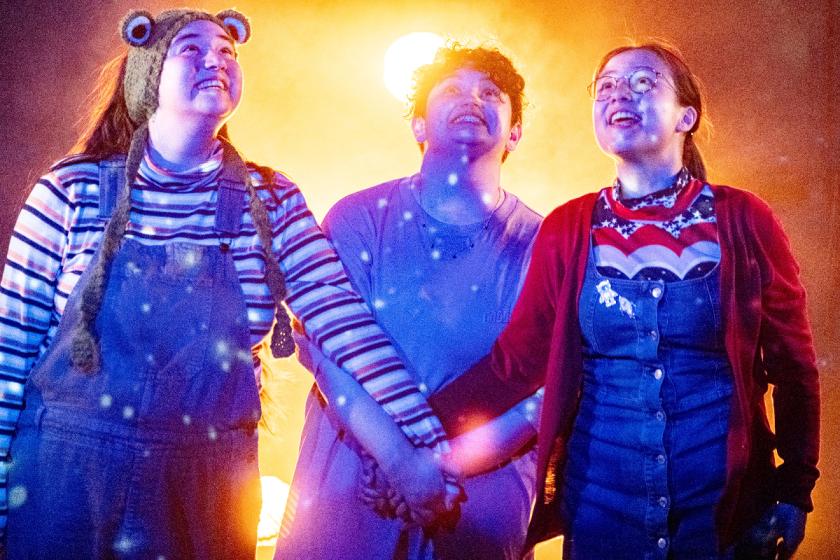"In care". It’s a phrase that, if it penetrates our minds at all, usually leads to distressing tabloid stories of children losing their lives at the hands of abusive parents (“Why oh why wasn’t this child in care?”) or of loving parents separated from their sons and daughters by over-zealous bureaucrats (“Social workers tore our family apart”).
It’s a difficult subject to address, which is one reason why it’s more often done in the abstract, the language administrative, quasi-legal or covered a radio phone-in in which we’re invited to sum anecdotes in order to produce data. Well meant naturally, but it doesn't get to the heart of the matter.
It is telling that the 58-year-old Play For Today, Cathy Come Home, is still the reference point for this subject (and it’s no surprise that the protagonist of this production shares almost the same name), that multi-generational time gap a testament to writers’ unwillingness to tackle Care or, perhaps, to their inability to make successful productions in that iconic TV play’s long shadow. Of course, another explanation is that too few care-leavers are involved in theatre, indeed, involved in the life of the country, a problem surely set to worsen as councils pare back support services with an ever-more ruthless hand.
There’s a sense then that Alex Howarth’s Edinburgh 2022 hit now in London for the first time, is important just for being staged at all - that it succeeds as a compelling and deeply moving play is almost a bonus.
 We meet three sisters who long, not for Moscow, but for the mother who went to buy a slushie at the bowling alley (they were there to stay warm, not to have fun) and didn’t come back. She led a chaotic life, delegating parenting of her 11 year old, Tin, and eight year old, Kit, to her 17 year old, Cassie, who clings to her sense of duty to look after and protect her siblings in a world that lashes her from pillar to post. The two younger girls are feisty and intelligent, damaged but resilient, but one fears for Cassie, over-invested in the one stable point in her life, a good kid who can never be good enough for herself and, one fears, the authorities.
We meet three sisters who long, not for Moscow, but for the mother who went to buy a slushie at the bowling alley (they were there to stay warm, not to have fun) and didn’t come back. She led a chaotic life, delegating parenting of her 11 year old, Tin, and eight year old, Kit, to her 17 year old, Cassie, who clings to her sense of duty to look after and protect her siblings in a world that lashes her from pillar to post. The two younger girls are feisty and intelligent, damaged but resilient, but one fears for Cassie, over-invested in the one stable point in her life, a good kid who can never be good enough for herself and, one fears, the authorities.
Things come to a head during a placement with a middle-aged, middle-class couple in Leeds who, from a good place (as the saying goes) induct Tin and Kit into a comfortable life - Netflix, ice cream and avocado on toast. They like how things are turning out, the playground bullying diminished, warm face, warm hands, warm feet, oh, isn't it just loverly? Cassie sees things differently. She sees their mother fading away in Tin and Kit’s consciousness, her own raison d’être undermined by a new parental figure. She wrestles with the contradiction of the younger ones lives growing while her own diminishes. You see that there’s a catharsis coming, but, and this is a fine tribute to Howath’s sensitive writing, you can’t see how it will go until the very last moment.
Alex Brain (pictured above), Helen Chong and Emily McGlynn wholly inhabit the three girls who circle each other, never quite apart, but feeling the pull of different lives developing. McGlynn gets the comic moments just right as Kit, but she skilfully avoids both too much cuteness and too much sentimentality as the youngest of the trio. Chong is the science nerd on the cusp of discovering boys and instictively sensing the potential of the new life they've been offered, and how her elder sister is not entirely altruistic in her desire to hold on to her quasi-maternal role.
Brain delivers the emotional gut punches, desperate to hang on to the family she has created, buffeted by adults who only treat her as an adult when it suits them and so very hurt by the neglect of her mother. To her credit, she never allows victimhood to overpower her character, nor does the play seek the easy answers of creating heroes and villains in fiendishly complicated moral maze.
If the timing of the final 15 minutes goes slightly astray, as the message pokes slightly too intrusively through the drama, that's a minor flaw in a piece that had me continually examining my own 27 years as a parent. Between gulping back the lumps in my throat of course.















Add comment